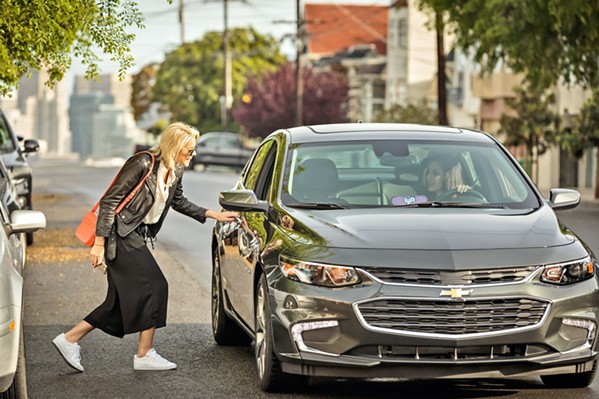[{
"name": "Ad - Medium Rectangle CC01 - 300x250",
"id": "AdMediumRectangleCC01300x250",
"class": "inlineCenter",
"insertPoint": "8",
"component": "2963441",
"requiredCountToDisplay": "12"
},{
"name": "Ad - Medium Rectangle LC01 - 300x250",
"id": "AdMediumRectangleCC01300x250",
"class": "inlineCenter",
"insertPoint": "18",
"component": "2963441",
"requiredCountToDisplay": "22"
},{
"name": "Ad - Medium Rectangle LC09 - 300x250",
"id": "AdMediumRectangleLC09300x250",
"class": "inlineCenter",
"insertPoint": "28",
"component": "3252660",
"requiredCountToDisplay": "32"
}]
Proposition 22 on this year's California ballot reexamines whether gig workers for app-based transportation and delivery are independent contractors or if they'll continue to be categorized as employees, which state law currently requires.
The proposed law, created by Uber, Lyft, Instacart, and Doordash, would exempt app-based transportation and delivery companies from providing employee benefits to certain drivers and reclassify drivers as independent contractors. According to campaign finance reports, as of Sept. 4, Uber, Lyft, Doordash, and Instacart have collectively poured more than $180 million into their initiative Yes on 22.
Lyft and Uber driver Justin Vitcov, 42, said he believes the proposition also sets a dangerous precedent for the potential future of the gig economy.
He's against the proposition.
While the proposition is industry-specific and only going before the voters in California, if passed he said, other industries might want to benefit from the exemption, and the rideshare companies could place the initiative on the ballot in other states as well.
"Under Proposition 22 we're still defined as independent contractors but it takes away our ability to negotiate the terms of that contract," Vitcov said.
Vitcov is a Santa Cruz native who started driving for Uber and Lyft in 2018 on the cusp of a career change. He needed a flexible job to cover his expenses while he returned to school.
He said he focuses on commuter hours in Silicon Valley but takes pickup requests in Santa Cruz as well.
"My goal is always to bring home about $30 to $40 an hour range. But of course when you subtract car expenses, gas, and whatnot you're of course taking home a lot less than that," he said.
On top of driving for the ridesharing apps, Vitcov also has a few independent contracting jobs that he works throughout the year to make ends meet.
With the other independent contracting gigs, Vitcov said he meets with his direct employer when the contract is up at the end of the year and discusses its terms, including wages.
"That doesn't happen with Uber and Lyft. You go online, sign up, and read their fine print contract agreement. And then as time goes on, you find out that they can change the rates that they're paying you literally overnight. Sometimes you log into the app and the rates have changed," he said.
Vitcov is a member of the Rideshare Drivers United, an organization working toward a fair, dignified, and sustainable rideshare industry. Its advocating for voters to vote against the proposition.
Proposition 22 comes a year after California passed Assembly Bill 5, which was designed to determine a worker's status as an independent contractor or an employee. Under the bill that went into effect on Jan. 1, 2020, companies were forced to provide their drivers with health insurance, paid time off, and other benefits.
Under the Assembly bill, a worker is an employee rather than an independent contractor unless the hiring business can prove otherwise through an ABC test.
The test includes whether the person is free from the control and direction of the hiring entity; whether the person performs work that is outside the usual course of the hiring entity's business; and whether the person is customarily engaged in an independently established trade, occupation, or business of the same nature as that involved in the work performed.
Proponents of Proposition 22 include the Yes on 22 coalition. They say that a vote in favor will keep the job flexible with guaranteed hourly earnings and per-mile compensation, implement new public safety protections that include background checks, and keep app-based services affordable for users.
According to an independent study by the Berkely Research Group, if Proposition 22 gets voter approval, rideshare companies will be on the hook for providing their drivers with benefits that could come at a cost to app users. The analysis found that rideshare service consumers could pay increases ranging from 25.9 percent to 100 percent in some markets—meaning a typical ride across town would cost between $19 and $30.
The study also concluded there could be "a reduction of the customer base served to only those persons residing in the most densely populated areas of the state—meaning little or no service to most Californians living in rural or suburban areas of the state." The consulting firm also reported that drivers' average hourly compensation could be reduced from $19.55 per hour to approximately $14.67 per hour under the employment model.
Lyft shared the report via its website. Δ
Latest in News
Readers also liked…
-

Coast Unified teachers upset over new position's salary and qualifications
Oct 20, 2022 -

SLO police identify alleged driver who hit and killed couple
Dec 22, 2022 -

When the levee breaks: Oceano residents, county officials walk a tightrope of regulations to manage Arroyo Grande Creek, which some say led to the levee's failure in January
May 18, 2023









